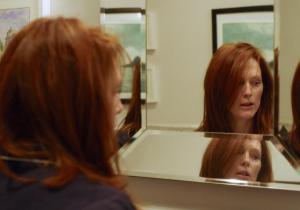It starts with a slip so small, so subtle, that it goes unremarked by everyone present. At the birthday celebration for Alice Howland (Julianne Moore), her rejoinder to a question about the sibling rivalry between her two daughters concerns her relationship with her own sister, now deceased. It is a moment that evokes what is best and worst about STILL ALICE, based on the book by Lisa Genova, a film in which Moore delivers a brilliant performance in a film that is less a drama than a clinical study and exposition of early onset Alzheimer’s.
To be fair, the exposition is folded neatly into Alice’s visits to her neurologist, wherein the reasons for, symptoms of, and prognosis surrounding said form of Alzheimer’s are detailed. It’s informative, and gives us in the audience plenty to fret about when a word escapes us, but it’s the decision by directors Wash Westoreland and Richard Glatzer to let Moore’s face tell the emotional story that is the saving grace at work here. She listens with such visceral presence – fear, hope, despair, denial – that the film plays as the emotional thriller that it should be, only rarely skirting the shores of treacly melodrama.
The slip is, of course, the first symptom, followed in short order by an inability to remember a word of familiar jargon, and suddenly becoming lost while on a run near her home. There begins the familiar tropes of diagnosis, discussion, coping, and courage. They all appear in the proper order, and Alice, capable, strong, and resilient meets it all with intelligence and only one or two slips into terror when she finally breaks the news to her doctor husband (Alec Baldwin). He, further of course, is a paragon of support, sparing Alice everything, and their three children as much as possible as they all learn to live with a new reality.
That losing language is part of the symptoms Alice faces is rendered ironic by having her be a professor of linguistics at
Columbia, respected in her field. More pedestrian is the family life with which Alice is gifted, adored by her husband and children. Even Lydia (Kristen Stewart), the wayward youngest child. While her brother (Hunter Parrish) is studying to become a doctor like his father (Alec Baldwin), and her sister (Kate Bosworth) has found success as a lawyer, Lydia has opted out of higher education to pursue a so far fruitless career as an actress on Los Angeles. Alice’s condition forces Lydia to attempt to heal their rift as soon as possible, while her mother can still remember her, and while this, too, is a tired trope, the way Stewart plays it, pushing aside years of ego, stubbornness, and pride to connect with Alice, makes for a bittersweet urgency, and certainly no assurance that all will work out.
It’s hard to get past flagrantly pandering moments that find Alice, already impaired by still plucky, delivering a speech to an Alzheimer’s group about her experiences. There is nothing in that speech that Moore hasn’t already shown us, and nothing that she won’t show us in the last stages of her disease when we come to realize that the suffering people assume she is experiencing is, in fact, felt only by those around her. And again, it’s Moore’s performance that gets that across to us. The progression of the disease is so gradual, and Moore so pinpoint in her accuracy in depicting every stage that it’s all but imperceptible as it plays out. Fortunately, there is a devastating sequence that demonstrates Moore’s acuity. It is Alice in the later stages, when she no longer quite knows who she is, discovering a video she made when first diagnosed with Alzheimer’s. As the present day Alice, affable, untroubled, and simple watches her old self, the one in control but with the pressure of what it happening weighing her down, the difference in the two women is like being struck by a thunderbolt. The nuances is not in the difference, the strong will replaced by a willing suggestability, but in the similarities that make both women the same person in their essence, but not their reality.
Hence the title: STILL ALICE. This is a film that poses troubling questions about what is left when memories are taken from us. And to answer them with both frankness and with compassion.


Your Thoughts?